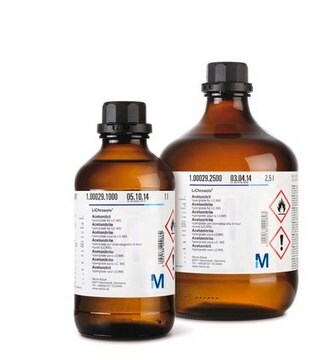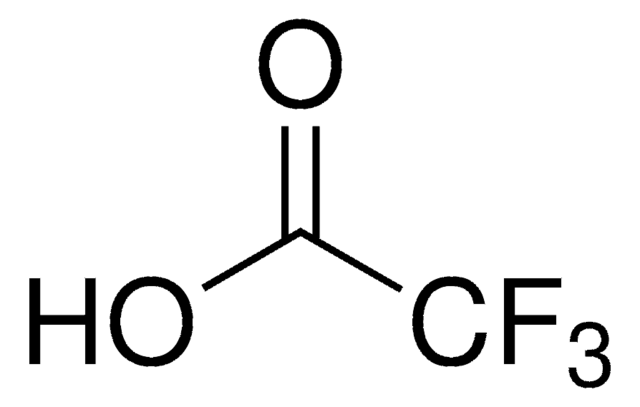4.80448
Acetonitrile solution
HPLC grade, suitable for HPLC, LiChrosolv®, contains 0.1% (v/v) trifluoroacetic acid
Synonym(s):
Acetonitrile solution, ACN, ACN + TFA, Cyanomethane, Ethyl nitrile, Methyl cyanide
About This Item
Recommended Products
Product Name
Acetonitrile with 0.1% (v:v) trifluoroacetic acid, for liquid chromatography LiChrosolv®
grade
HPLC grade
Quality Level
vapor pressure
97 hPa ( 20 °C)
description
isocratic
product line
LiChrosolv®
form
liquid
concentration
0.095-0.105 % (v/v) (trifluoroacetic acid)
technique(s)
HPLC: suitable
transition temp
flash point 2 °C (Acetonitrile)
density
0.782 g/mL at 25 °C
format
mixture
storage temp.
2-30°C
SMILES string
CC#N
InChI
1S/C2H3N/c1-2-3/h1H3
InChI key
WEVYAHXRMPXWCK-UHFFFAOYSA-N
Looking for similar products? Visit Product Comparison Guide
General description
Application
- Retention time prediction for post-translationally modified peptides: Ser, Thr, Tyr-phosphorylation.: This study presents a methodology for predicting retention times of phosphorylated peptides using high-performance liquid chromatography (HPLC) (Battellino et al., 2024).
- Development and validation of a UPLC-PDA method for quantifying ceftazidime in dried blood spots.: This paper outlines a validated ultra-performance liquid chromatography photodiode array (UPLC-PDA) method for the quantification of ceftazidime, demonstrating its application and accuracy in analyzing dried blood samples (Lv et al., 2024).
- A facile fabric phase sorptive extraction method for monitoring chloramphenicol residues in milk samples.: Describes a new method using fabric phase sorptive extraction for the efficient monitoring of chloramphenicol in milk, highlighting its simplicity and effectiveness (Ben Ayed et al., 2024).
- Study of sample preparation influence on bacterial lipids profile in matrix-assisted laser desorption/ionization time-of-flight mass spectrometry.: This research investigates how different sample preparation methods affect the lipid profiles of bacteria analyzed by MALDI-TOF MS, providing insights into optimizing protocols for better accuracy (Arendowski et al., 2024).
- Simple and robust LC-MS/MS method for quantification of colistin methanesulfonate and colistin in human plasma for therapeutic drug monitoring.: This article details a robust and straightforward liquid chromatography-tandem mass spectrometry (LC-MS/MS) method for the simultaneous determination of colistin methanesulfonate and colistin in human plasma, useful in clinical settings (Kim et al., 2023).
Analysis Note
Lotnumber (trifluoroacetic acid):
Lotnumber (acetonitrile):
Required quantity (trifluoroacetic acid):
Required quantity (acetonitrile):
Other Notes
Legal Information
Signal Word
Danger
Hazard Statements
Precautionary Statements
Hazard Classifications
Acute Tox. 4 Dermal - Acute Tox. 4 Inhalation - Acute Tox. 4 Oral - Eye Irrit. 2 - Flam. Liq. 2
Storage Class Code
3 - Flammable liquids
WGK
WGK 2
Flash Point(F)
35.6 °F - (Acetonitrile)
Flash Point(C)
2 °C - (Acetonitrile)
Certificates of Analysis (COA)
Search for Certificates of Analysis (COA) by entering the products Lot/Batch Number. Lot and Batch Numbers can be found on a product’s label following the words ‘Lot’ or ‘Batch’.
Already Own This Product?
Find documentation for the products that you have recently purchased in the Document Library.
Customers Also Viewed
Our team of scientists has experience in all areas of research including Life Science, Material Science, Chemical Synthesis, Chromatography, Analytical and many others.
Contact Technical Service




